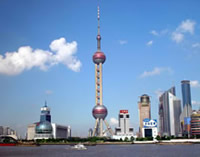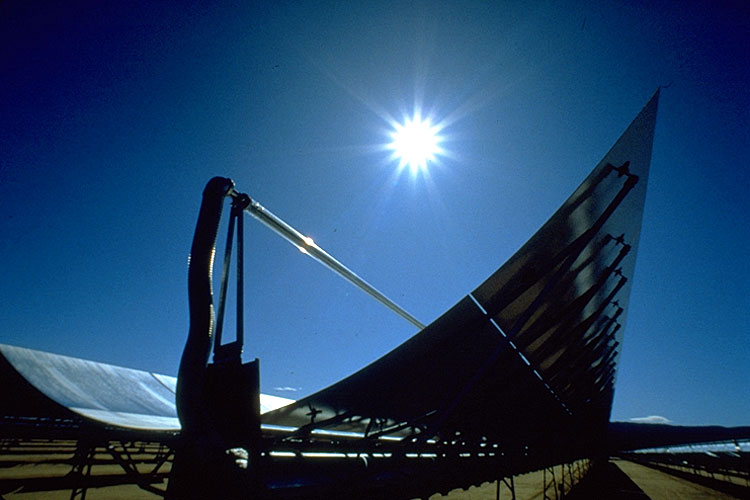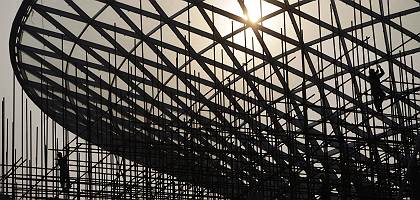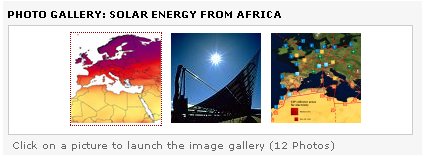|
|


ADVERTISEMENT
Buy Your own advertising
spaces!
.
Download Adobe Acrobat Reader to open [PDF] files.
Recent Visitors
Desertec Solar Project 'an Encouraging Economic Sign'
2009. 17 June
 (spiegel.de)
With the planned Desertec project, Europe wants to build a giant solar power plant to convert the endless sun in the Sahara Desert into CO2-free electricity. The mega project isn't without its critics, but most German commentators are welcoming Tuesday's announcement that the ambitious solar plans may soon move forward.
(spiegel.de)
With the planned Desertec project, Europe wants to build a giant solar power plant to convert the endless sun in the Sahara Desert into CO2-free electricity. The mega project isn't without its critics, but most German commentators are welcoming Tuesday's announcement that the ambitious solar plans may soon move forward.

Workers in China putting together a solar energy facility in Shanghai in preparation for the 2010 Expo.
The vision is an attractive one. Imagine a gigantic solar thermal power plant stretching across the deserts of North Africa, sending huge quantities of energy across the Mediterranean to Europe -- and emitting no CO2 in the process.
That, at least, is the idea behind Desertec, a €400 billion ($555 million) project which has been in the works for years. On Tuesday, a group of 20 companies, groups and governments revealed they would meet in mid-July to discuss the way forward. Should the venture ultimately become reality, it could cover up to 15 percent of Europe's energy needs as well as provide power to North African countries.
Perhaps the most attractive part of the plan is the relative simplicity of the technology involved. Massive fields of collectors would concentrate sunlight to heat water, with the resulting steam then driving energy-producing generators. A similar power plant has been in operation in California since the 1980s and three of them have recently been built in Spain.
The Desertec project, though, would be the largest of them all. The current consortium hopes to be able to present concrete plans for the facility within two to three years. German commentators on Wednesday take a look at the project.
The financial daily Handelsblatt writes:
Despite the fact that the technical difficulties have been solved, "political hurdles remain. Countries in North Africa are hardly models of political stability. But that is even truer of some gas and oil suppliers on whom we are currently reliant. The European Union would be well advised to intensify its relations with the Maghreb states and thereby promote the idea of electricity generation in the desert."

"Of course it would be naïve to believe that all of our power could come from the Sahara within just a few years. But desert electricity could become an important element of Europe's climate-friendly energy mix. Either way, much will change in coming years. The importance of large fossil-fuel-driven power plants will shrink; decentralized power-generation structures will increasingly prevail. Part of that will be a radical reconstruction of the power grid, which could easily be modified to include solar-generated power from the south."
"It is even possible that tax subsidies would, for once, make sense. For the moment, in any case, we in Germany are pumping billions into domestic solar power every year -- with absurdly low returns."
The Financial Times Deutschland writes:
"Of course it isn't ecological concerns that have led several large companies to (join the desert power project). A hoped-for image boost is likewise not the decisive factor, even if companies like the coal-power plant concern RWE and the nuclear reactor manufacturer Siemens could use the green hue."
"Rather, the project is sending a strong signal that investments in renewable energies don't just make ecological sense -- they make economic sense as well. The potential partners are convinced that they can, in the foreseeable future, use giant solar thermal power plants in sunny regions to generate power and competitive prices. Particularly in the economic crisis, that is an encouraging sign -- because the economic crisis has threatened to take a bite out of investment in future-oriented technologies, even if that would be negligent."
The left-leaning daily Die Tageszeitung writes:
"There is reason to be wary (of the solar project) on at least one point: The desert plans cannot be allowed to impinge in the slightest on the further development of solar power in Germany. Should politicians use the Sahara facility as an excuse to one day slow down domestic solar power projects, it would be a disaster."
"Particularly given the promising nature of the North Africa project, it must once again be pointed out that the most successful method of harvesting solar power is with rooftop panels. In just three to five years, power from the roof will be cheaper than electricity from the wall plug. The economic bar for desert power is, in other words, high. Solar power produced in a decentralized manner will likely always be the cheaper variety -- because no matter how powerful the sun is in the Sahara, the costs of transporting the resulting electricity will be difficult to compensate for."
Conservative daily Die Welt writes:
"The solar panels that were installed on German roofs in 2008 created €10 billion in extra costs for consumers due to (the requirement that German energy concerns buy solar-generated power at a fixed, higher-than-market price). With that amount of money, one could have saved Karstadt, Quelle and Opel all at once -- but in the hands of Germany's solar-billionaires, the money resulted only in a tiny, hardly measurable increase in the amount of renewable energy in the German mix."
"Desert power from solar thermal power plants would be cheaper and there would be a constant supply. But Germany's solar lobby apparently wants to teach environmentally aware consumers that solar power is good when it is generated domestically with billions in subsidies. And it's bad when it comes from projects that benefit the poor in Africa."
by Charles Hawley


